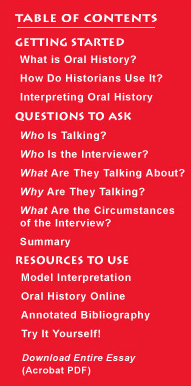talking history | syllabi | students | teachers | puzzle | about us

|
For the historian, oral history interviews are valuable as sources of new knowledge about the past and as new interpretive perspectives on it. Interviews have especially enriched the work of a generation of social historians, providing information about everyday life and insights into the mentalities of what are sometimes termed "ordinary people" that are simply unavailable from more traditional sources. Oral histories also eloquently make the case for the active agency of individuals whose lives have been lived within deeply constraining circumstances. A single example here must suffice. For their study of deindustrialization in the anthracite coal region of northeastern Pennsylvania, historians Thomas Dublin and Walter Licht interviewed almost ninety men and women who had lived through the long economic decline that started when the region's mines closed during the mid-twentieth century. Getting underneath the statistical summaries and institutional responses afforded by census data, government reports, and company and union records, the interviews are replete with information about the various and deeply gendered strategies individuals used to cope with this disaster: men traveled long distances to work in factories outside the region, often living in nearby boardinghouses during the week and returning home only on the weekends; women held families together while themselves entering the paid labor force; families made do, went without, and expected little; some, with fewer ties to the region, pulled up roots and relocated elsewhere. Interviews also reveal subtle shifts in the power dynamics within marriages, as unemployment undermined men's authority even as employment enhanced women's status; and changes in parental expectations for children, who had to forge lives in new economic circumstances. Summing up what they have learned from their interviews, Dublin and Licht have written: The oral histories of the men and women of the anthracite region in general render a complicated picture of economic crisis. Neither catastrophe nor a complete restructuring of life marked the collapse of the area's economy. Unevenness characterized the experience--the consequences for and responses of different communities, families and individuals varied. . . . As business and labor historians have recently emphasized the unevenness of capitalist economic development--industrialization, for example, unfolding in varying ways and with varying consequences in different trades and communities--interviews with those who have faced modern-day long-term crises of economic decline suggest that unevenness is a valuable concept for our understanding this contemporary experience as well.* It is not difficult to understand how, in interview after interview, oral history opens up new views of the past. For in an interview, the voice of the narrator literally contends with that of the historian for control of the story. Recounting the experiences of everyday life and making sense of that experience, narrators turn history inside out, demanding to be understood as purposeful actors in the past, talking about their lives is ways that do not easily fit into preexisting categories of analysis. Of course, not all oral history falls into the category of social history. Interviews abound with politicians and their associates, with business leaders, and the cultural elite. In addition to recording the perspectives of those in power, these interviews typically get at "the story underneath the story," the intricacies of decision-making, the personal rivalries and alliances and the varying motives underlying public action, that are often absent from the public record. Some interview projects also focus on very specific topics--like memories of a flood, participation in a war, or the career of a noteworthy individual--rather than the more encompassing narratives typical of social historians. While these interviews certainly add to our store of knowledge, particularly illuminating the relationship of the individual to major historical events, their limited focus is often quite frustrating to historians and archivists. In addition to providing new knowledge and perspectives, oral history is of value to the historian in yet another way. As David Thelen and Roy Rosenzweig have demonstrated in The Presence of the Past, most people engage with the past in deeply personal ways, drawing upon it as a resource for enhancing identity and explaining experience. Yet at the same time they seem uninterested in understanding anything other than their own personal experience and claim that the formal study of history is "boring."* Oral history affords the historian a way to negotiate this paradox and perhaps helps surmount the barrier separating the analytic work of the professional historian from vernacular efforts at history-making. For oral history interviews are often quite simply good stories. Like literature, their specificity, their deeply personal, often emotionally resonant accounts of individual experience draw listeners--or readers--in, creating interest and sympathy. Edited carefully, they can open the listener to a life very different from his or her own in a non-threatening way. Contextualized thoughtfully, they can help a reader understand personal experience as something deeply social. Nonetheless, some have argued, not without cause, that the highly individual, personal perspective of an interview, coupled with the social historian's typical focus on everyday life, tend to overstate individual agency and obscure the workings of political and cultural power. Indeed, not surprisingly, many narrators recall with great pride how they coped with life's circumstances through individual effort and sustained hard work, not by directly challenging those circumstances. And, it must be said, narrators are a self-selected group; the most articulate and self-assured members of any group - the literal and psychic survivors - are precisely those who consent to an interview, creating an implicit bias. Nonetheless, oral history does complicate simplistic notions of hegemony, that is the power of dominant political or cultural forces to control thought and action, as individuals articulate how they have maneuvered, with greater or lesser degrees of autonomy or conformity, risk, calculation or fear, within the circumstances of their lives. |
|||

|
||||

